Learn more about the career journeys of recent MCSI alumni and how their experiences with the center have benefited them in their professional lives. Do you want to get involved and share more about your sustainability professional journey. Reach out to us at mcsi@pitt.edu
Stay up to date on sustainability efforts at the University of Pitt! The Pitt Sustainability Alumni & Partner Newsletter delivers university-wide achievements, faculty and student highlights, campus sustainability initiatives, and the latest news from the Mascaro Center for Sustainable Innovation in quarterly installments.
Want to receive our quarterly email updates? Sign up here!
- Kate Zettl
-
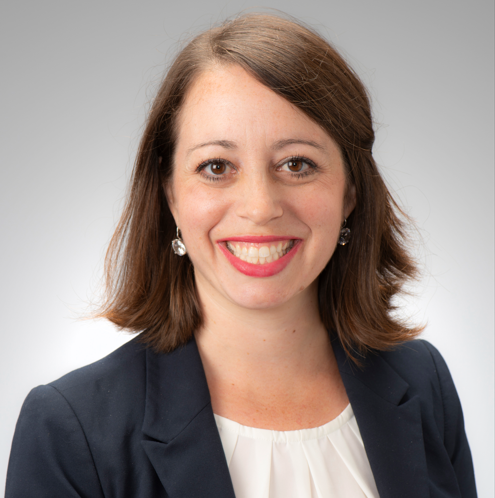
From her own words:
When Kate Zettl graduated from Pitt in 2009 with her bachelor’s in civil and environmental engineering, the Pitt sustainability department was just starting. Kate’s inspiration to pursue a sustainability-related career path can be traced back to family, particularly her older sister, who graduated from Pitt’s Mechanical Engineering program. Her sister’s enthusiasm for sustainability sparked Kate’s interest, and studying abroad in Australia further fueled Kate’s passion, particularly through a class titled Greening the Built Environment and participating in tours of sustainable buildings. After graduating from Pitt, Kate participated in a fellowship program with the US Congress and German Bundestag, where she focused on renewable energy in Hamburg, Germany working for a solar manufacturer for over a year.
After returning from Germany, Kate started laying a foundation for her energy and sustainability work in her hometown of Pittsburgh. Kate joined PNC in 2014 during the green building transformation, including the construction of The Tower at PNC Plaza and with numerous LEED certified bank branches and office buildings. In 2022, she was instrumental in signing PNC’s first long-term power purchase agreement to develop 78 MW of new solar and power 50% of the facilities with renewable energy. While at PNC, she was accepted in a fellowship in Italy, earning an executive certificate in business management and entrepreneurial development and working for a high-end furniture manufacturer to integrate circular economy principles and biobased materials into their product design. After her time at PNC, Kate moved to her current role as the Director of Energy and Environmental Engineering at UPMC, applying her expertise in energy to the healthcare sector. In this role in the new Center for Sustainability at UPMC, Kate has been responsible for increasing the use of renewable energy, developing energy and water efficiency projects, and creating an energy and carbon emission reduction strategy.
Kate highlights that health-care facilities are very energy-intensive due to their around-the-clock operations and the high demand for lighting, ventilation, and medical equipment and machines. . To combat this, the Center for Sustainability at UPMC aims to reduce their carbon footprint by 50% (Scope 1 and 2 emissions) by 2030 and achieve carbon neutrality by 2050. It is Kate’s goal to further increase the use of renewable energy and establish key partnerships with research centers, universities, start-ups, and other industry-leading organizations. One of the biggest challenges is securing financial capital, so finding opportunities for incentives, rebates, and grants, as well as exploring viable financial models for energy power agreements, is crucial.
Last year, Kate was selected to participate in the National Renewable Energy Laboratory (NREL)’s Executive Energy Leadership program, which allowed her to go behind the scenes of cutting-edge laboratories and engage with world-renowned researchers and engineers in renewable energy. Kate would like to encourage others to seize opportunities to travel and work in the sustainability field, as it can broaden your perspective and inspire creative solutions to global challenges.
- Matthew Hess
-
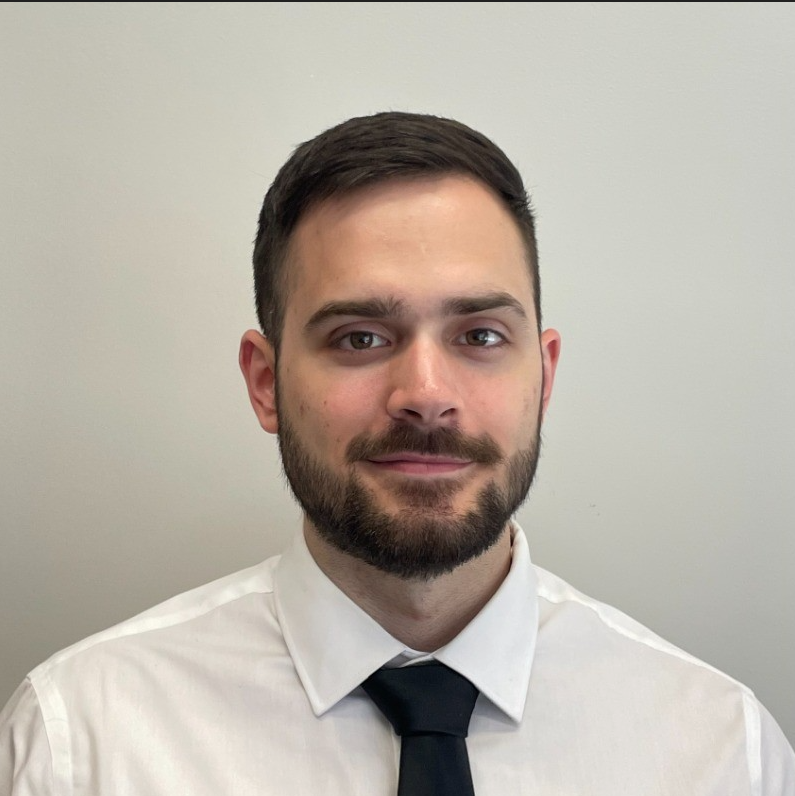
From his own words:
Matthew Hess graduated from the University of Pittsburgh in 2022 with a dual degree in Economics and Environmental Studies. During his time at Pitt, he enjoyed the diverse topics within Pitt Sustainability, learning the intersectionality of science and policymaking in informing climate change. While his main goal during his undergraduate studies was to move into sustainability work post-graduation, he began his career experience with the Boston Consulting Group (BCG). There, he gained hands-on experience interacting with customers, efficiently solving real-world problems, and learning how to work with data to help manage stakeholders.
After his time with BCG, he felt determined to return to the sustainability sector, recognizing the need for reduced emissions in large corporations. From his experience in BCG, Matt discovered CO2AI, BCG’s startup in carbon accounting and corporate sustainability. CO2 AI offers a platform for large companies to measure carbon comprehensively and implement decarbonization strategies across their entire organization. Matt’s current role as Customer Success Manager allows him to work with both data science teams calculating carbon footprint, as well as working with customer teams to implement decarbonization strategies and foster communication.
CO2AI works with some of the largest companies in the world, many of whom are aiming to reach ambitious net-zero goals. This incredible impact within CO2AI is what inspired Matt to pursue his current role. While most companies are currently focused on the measurement and accuracy portion of carbon tracking, Matt is excited for the upcoming implementation of new decarbonization strategies with the help of his company.
Though Matt’s career path did not start directly within the sustainability sector, his past career experiences allowed him to move towards a role that combines both his previous skills with his passion for sustainability, showing that there is always an opportunity for redirection.
- Isabella Cicco
-
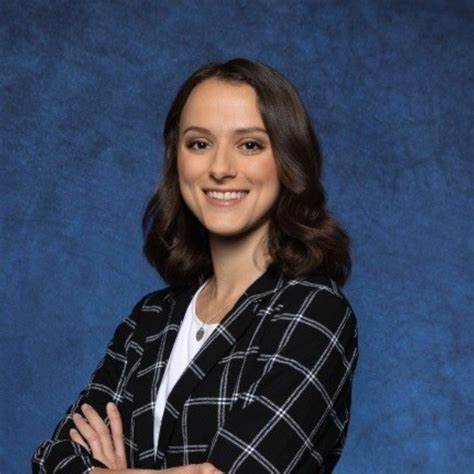 Isabella Cicco is a second-year Civil Engineering PhD student at the University of Pittsburgh Swanson School of Engineering. Her current research focuses on Urban Building Energy Modeling, or looking from a city scale at how to make the built environment more energy efficient. This modeling will help to determine which policies could best assist in reducing overall emissions.
Isabella Cicco is a second-year Civil Engineering PhD student at the University of Pittsburgh Swanson School of Engineering. Her current research focuses on Urban Building Energy Modeling, or looking from a city scale at how to make the built environment more energy efficient. This modeling will help to determine which policies could best assist in reducing overall emissions.In her time as an undergraduate student at Pitt, she voluntarily participated in a handful of sustainability classes in conjunction with her civil engineering degree. These classes, focused on topics such as sustainable development, led to a blossoming passion for sustainability in her work. This passion further grew from her experience studying abroad through the Engineering Perspectives of the Renaissance and Sustainability program in Florence. One key takeaway from these academic and extra-curricular experiences in sustainability was the opportunity to expand her perspective. Working with students from across all majors and schools allowed her to explore new sustainability opportunities and viewpoints. These experiences led to her feeling a growing responsibility to help the environment and communities through her work.
In addition to her research, Isabella worked with Aurora Sharrard and Melissa Bilec to publish the 2023 Greenhouse Gas Inventory last year. This inventory highlights which sectors of University operations, directly and indirectly, are contributing most to our emissions. It was found that 35% of all emissions came from electricity - a fact that Isabella feels could lead our actions moving forward. As the largest contributor, electricity largely comes from maintaining Pitt buildings, including high-energy structures such as labs and our older buildings. While Pitt has made incredible strides in implementing changes such as LED lighting and recycling, Isabella suggests additional improvements to current building energy efficiency to further reduce emissions. Another large contributor of greenhouse gas emissions was transportation, which Isabella noted is harder to diminish but still crucial to highlight in emission reductions. To further reduce Pitt’s electricity emissions, Isabella noted Pitt’s current collaboration with Gaucho Solar Farm, which will supply an incredible 18% of Pitt's energy from the renewable source of solar. To learn more about Pitt’s current emissions, be sure to read the 2023 Greenhouse Gas Inventory.
"It’s a privilege to work with talented students like Isabella," said Dr. Melissa Bilec, co-director of the Mascaro Center. "Through her involvement in Pitt’s Greenhouse Gas Inventory, Isabella is not only acquiring the crucial technical skills needed for this task but also gaining a comprehensive understanding of university operations, from travel to energy and waste management. Her efforts are instrumental in helping Pitt achieve its goal of carbon neutrality by 2037.
Isabella was once a student in the study abroad course I co-teach with Drs. Robertson and Gaudi, focusing on Renaissance Engineering and Sustainability in Florence, Italy. A few years later, she returned as a program assistant for the same course! Teaching in Italy and having these unique opportunities significantly shape our collective future. Isabella has an incredibly bright future ahead, and I am excited to see what she accomplishes next.”
Isabella hopes to see even larger strides for the inventory in the upcoming years, such as measuring emissions from construction on campus, as well as collaborating with Facilities Management to optimize renovation and energy efficiency projects to help reduce greenhouse gas emissions. As she continues to work on her research in energy efficiency, her positive impact on the Pitt community and environment will only continue to grow.
- Emily Albrecht
-
Emily is a former sustainability intern with Mascaro Center for Sustainable Innovation.
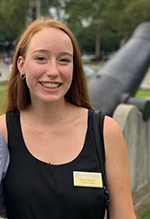 Emily Albrecht graduated in 2022 with a BS in Psychology, minors in Economics and Applied Statistics, and a certificate in Sustainability.
Emily Albrecht graduated in 2022 with a BS in Psychology, minors in Economics and Applied Statistics, and a certificate in Sustainability.While with MCSI, Emily led community engagement efforts in Homewood with the Oasis Project and the Hydroponics Club. Emily was also a part of Residence Life, participated in the MCSI Summer Research program, and served as an officer for the Hydroponics Club.
- Sinjon Bartel
-
Sinjon Bartel graduated from Pitt with a BS in Mechanical Engineering in 2019.
 In his own words:
In his own words: I started plugging in to Pitt sustainability as one of the founding members of the Pitt Bike Cave. As I worked on bike advocacy projects through this platform, I gained a broader awareness of the transportation inequity endemic to our city.
My peers at Pitt (hail 2 pitt) connected me with Pittsburghers for Public Transit: "a grassroots, democratic, member-led organization that fights for racial justice and public transit as a human right." I've since worked with PPT as a volunteer researcher, exploring local transit questions such as the impacts of Autonomous Vehicles on shared mobility systems and the efficacy of extending the Port Authority's East Busway.
Pitt sustainability also pushed me to think of sustainability in contexts other than ecological stewardship. Talks with SOOS kids brought on an awareness of social sustainability. Human rights, social equity, labor movements, and cultural competence are an indispensable part of "sustainability." When these aspects are ignored, we're staging failure for economic and environmental sustainability efforts.
After graduating, I picked up a job as a prototype machinist at Conturo Prototyping. We're a local small business started by Pitt engineering alum John Conturo. Our focus is on making high-precision prototypes on short lead times. We serve a wide range of industries; one day I'm working on a project for a company that manufacturing diapers and the next I'm making parts for the folks behind equipment installed on the International Space Station.
I also sold my car. That's eco, right? I bought a house in Bloomfield this spring. It's got a detached garage, so stayed tuned for another local bike co-op dropping on ya!
- Bruk Berhanu
-
Bruk Berhanu is a former MCSI intern and a former MCSI undergraduate summer researcher. He graduated from Pitt in 2013 with a BS in Civil and Environmental Engineering.
In his own words:
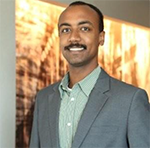 I am currently about to finish a doctoral program in Civil Engineering in August at the University of Texas at Austin. I also got my MS in Environmental and Water Resources Engineering and a Master of Public Affairs (MPAff) here.
I am currently about to finish a doctoral program in Civil Engineering in August at the University of Texas at Austin. I also got my MS in Environmental and Water Resources Engineering and a Master of Public Affairs (MPAff) here.I started with the Mascaro Center as an REU fellow in the summer of 2012, and that kickstarted my interest in water resources engineering research—so much so that I decided to go to graduate school for it.
I've also continued my sustainability education and outreach efforts with local youth that I started with MCSI in the Design Factory program at the Sarah Heinz House. My experiences with MCSI really shaped my whole perspective about my academic and professional future, for which I'm incredibly thankful!
- Anna T. Coleman
-
Anna is a former sustainability intern with Mascaro Center for Sustainable Innovation.
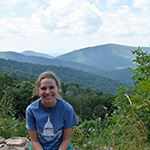 Anna Coleman graduated in 2021 with a BS in Statistics, a minor in Spanish, and a Global Studies certificate.
Anna Coleman graduated in 2021 with a BS in Statistics, a minor in Spanish, and a Global Studies certificate.As a Sustainability Intern, Anna was a critical MCSI team member for over three years. She led our first-year student sustainability programming, maintained our alumni network, authored our quarterly newsletter, and supported all of the center's signature programs.
- Alexander Dale
-
Alexander Dale graduated from Pitt with a BS in Engineering Physics in 2009 and earned a PhD in Civil and Environmental Engineering in 2013. He was also an IGERT Fellow.
In his own words:
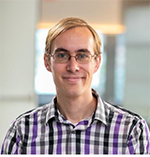 From 2013-2015 I was the Executive Director for Engineers for a Sustainable World, and also taught two courses a year at Pitt-ENGR 1060 on Social Entrepreneurship and one through the Honors College on Energy, Society, and Science Communication.
From 2013-2015 I was the Executive Director for Engineers for a Sustainable World, and also taught two courses a year at Pitt-ENGR 1060 on Social Entrepreneurship and one through the Honors College on Energy, Society, and Science Communication.Starting September 2015, I transitioned to a Board Membership at ESW, and started an AAAS Science & Technology Policy Fellowship, hosted by the EPA's Office of Transportation & Air Quality in their Transportation & Climate Division. I did a lot of work on biofuels and lifecycle assessment but also helped with analyses of electric vehicles, pipelines, CO2 sequestration, and future policy schemes for decarbonizing transportation in the U.S.
Since January 2017, I've been at Solve, an initiative of MIT focused on tackling global social and environmental challenges by finding innovators from around the world and connecting them to people who can help their work scale up. I lead the sustainability work, which includes all of our challenges on food, water, energy, and climate—we have other verticals around health, learning, and economic prosperity. Solve has only really been around since late 2016, so I've been part of the core team that's built it up to a thriving global community with 99 selected Solver teams and 100+ member organizations.
MCSI gave me an interdisciplinary education in technical sustainability, paired with opportunities for communication and outreach. The skills involved in all of those have been key in my career, as none of my jobs has been particularly tied to specific disciplines, and more often involve me acting as a translator (of sorts) between technical people or information and business or policy folks. I don't think many other programs would have prepared me as well for jumping between some of these different hats, even within specific jobs.
I also have a great appreciation for the IGERT Fellowship which taught me some Portuguese and sent me to Brazil in 2012. I learned a lot on the trip, published an interesting paper, but it's also been a great extra skillset—I lead a bunch of our work with Brazilian organizations at Solve, and have been able to run more effective workshops as a result of basic proficiency with Portuguese.
It is great to watch MCSI grow into a bigger part of Pitt's success story, particularly as more jobs require interdisciplinary knowledge and sustainability awareness.
- Candice DeLeo Novack
-
Candice earned a PhD in Chemical Engineering at Pitt in 2010 and was an MCSI IGERT Fellow.
In her own words:
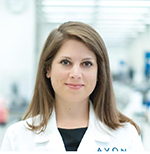 When I was a student, I enjoyed hearing about the different paths alumni pursued after leaving Pitt. Since I graduated in 2010, I've been working in Research and Development at Avon Products, Inc. I began my career at Avon in the upstream research group, scouting for new technologies to drive performance in cosmetic and personal care products and conducting experiments both inside the lab and with consumers. I now lead the downstream product development in the eye and face color categories and the consumer-centric product design team for all color categories.
When I was a student, I enjoyed hearing about the different paths alumni pursued after leaving Pitt. Since I graduated in 2010, I've been working in Research and Development at Avon Products, Inc. I began my career at Avon in the upstream research group, scouting for new technologies to drive performance in cosmetic and personal care products and conducting experiments both inside the lab and with consumers. I now lead the downstream product development in the eye and face color categories and the consumer-centric product design team for all color categories.My experience as an IGERT Fellow in the MCSI has been invaluable to my professional journey. Sustainability is still a growing trend—a trend that I believe will become the new normal—and is now woven into consumer product design across all categories, from cosmetics to automotive to electronics. My formal education has made me more savvy in product lifecycle analysis and has given me an edge over my colleagues who didn't have formal training.
My experiences outside of the U.S, particularly conducting MSCI research at UNICAMP in Brazil, enable me to put a more global lens on product development, design and technology.
- Grace Fanning
-
Grace is a former sustainability intern with Mascaro Center for Sustainable Innovation.
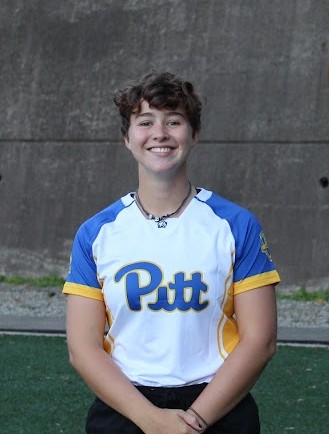 Grace Fanning graduated in 2023 with a BA in Environmental Studies, a BA in Urban Studies, and a Sustainability Certificate. While with MCSI, Grace began and oversaw the Center's alumni database and Faculty Resource Hub projects, which have helped expand MCSI's connections both on and off campus. Grace was also co-captain of the Pitt Rugby Team and worked as a part-time Natural History Interpreter at Carnegie Museum of Natural History while they were an undergraduate student.
Grace Fanning graduated in 2023 with a BA in Environmental Studies, a BA in Urban Studies, and a Sustainability Certificate. While with MCSI, Grace began and oversaw the Center's alumni database and Faculty Resource Hub projects, which have helped expand MCSI's connections both on and off campus. Grace was also co-captain of the Pitt Rugby Team and worked as a part-time Natural History Interpreter at Carnegie Museum of Natural History while they were an undergraduate student. - Hayley Gardner
-
Hayley earned her BS in Civil Engineering from Pitt in 2017 and an MS in Civil Engineering in 2019.
In her own words:
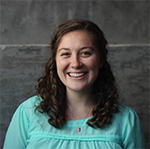 After graduation, I began my new job as the Zero Energy Specialist at the International Living Future Institute (ILFI). I'm a part of the Energy Team, and we are working to reduce the operational and embodied impacts of buildings! I work with project teams to provide them technical guidance regarding how they can meet our strict energy efficient and reduction requirements. We are also working on the development of guidance for our new Zero Carbon Program to address embodied carbon impacts.
After graduation, I began my new job as the Zero Energy Specialist at the International Living Future Institute (ILFI). I'm a part of the Energy Team, and we are working to reduce the operational and embodied impacts of buildings! I work with project teams to provide them technical guidance regarding how they can meet our strict energy efficient and reduction requirements. We are also working on the development of guidance for our new Zero Carbon Program to address embodied carbon impacts.MCSI provided me a space and support system to pursue research that could be translated into real-life impacts to improve the sustainability of the built environment. Due to academic support I received from MCSI's faculty and staff, I graduated on time and had the pleasure of working on a project I essentially got to build alongside my advisor. The professional support and guidance I received led me to my dream job today. It's obvious that I would not be where I am today without the faculty and staff of the MCSI.
- Elaina Geiger
-
Elaina is a former sustainability intern with Mascaro Center for Sustainable Innovation.
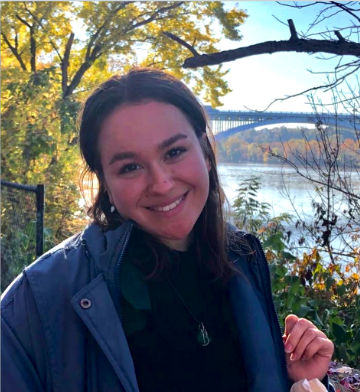 Elaina Geiger graduated in 2023 with a BS in Environmental Engineering. While with MCSI, Elaina led first-year student sustainability presentations and oversaw the Center's social media presence. Elaina is continuing her education at the University of Pennsylvania, where she is pursuing a Master's in City Planning with a concentration in Environmental Planning and Land Use.
Elaina Geiger graduated in 2023 with a BS in Environmental Engineering. While with MCSI, Elaina led first-year student sustainability presentations and oversaw the Center's social media presence. Elaina is continuing her education at the University of Pennsylvania, where she is pursuing a Master's in City Planning with a concentration in Environmental Planning and Land Use. - Young Grguras
-
Young earned their BS in Environmental Studies from Pitt in 2019.
In their own words:
I accepted a position at The Post-Landfill Action Network in April of my senior year at
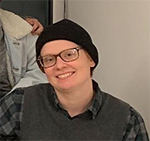 Pitt , started with them in July of 2019, and have been working with them since then. I get to advise schools all across the U.S. (and sometimes the world) on sustainable initiatives similar to the ones I worked on at Pitt.
Pitt , started with them in July of 2019, and have been working with them since then. I get to advise schools all across the U.S. (and sometimes the world) on sustainable initiatives similar to the ones I worked on at Pitt. Sustainability at Pitt, in all its forms of student activism, SOOS, Environmental Studies, basically defined my future. I still work in sustainability and always will.
Pitt was actually a member school of PLAN, and I used their advising while a student and now I'm on the other end of the calls, doing the advising to students! It's quite the glow-up.
Basically everything about my job is fun. I get to work with young adults that are changing the world, and make memes (like this one) as a part of my job, what else would I want?
- Connor Harbison
-
Connor earned his BA in European History and American Political Science from Pitt in 2015.
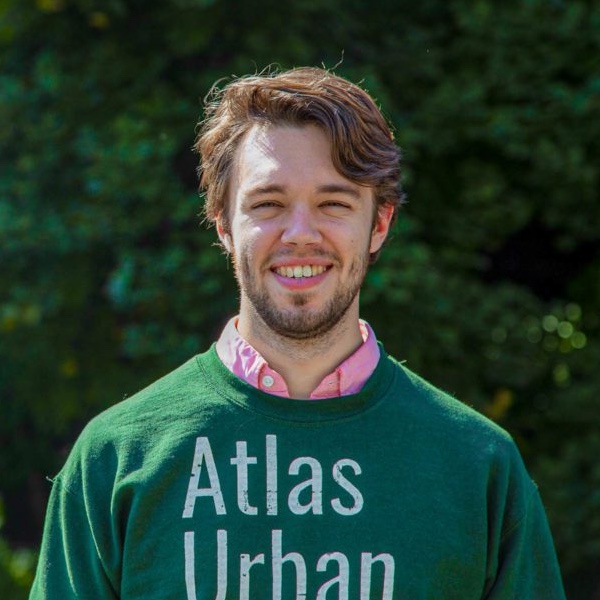 After graduating, Connor completed a fellowship in the United States House of Representatives, served for a year with AmeriCorps VISTA helping underserved communities fight poverty, and earned an MBA at Babson College, where he concentrated in entrepreneurship.
After graduating, Connor completed a fellowship in the United States House of Representatives, served for a year with AmeriCorps VISTA helping underserved communities fight poverty, and earned an MBA at Babson College, where he concentrated in entrepreneurship.Connor is the founder of Atlas Urban Farms, an award-winning startup focused on optimizing food production through a combination of hydroponics, IoT, and machine learning. Connor and the team at Atlas have partnered with MCSI to further develop their technology to reduce food-related carbon emissions at scale.
- Emily Hoag
-
Emily is a former community engagement intern with Mascaro Center for Sustainable Innovation.
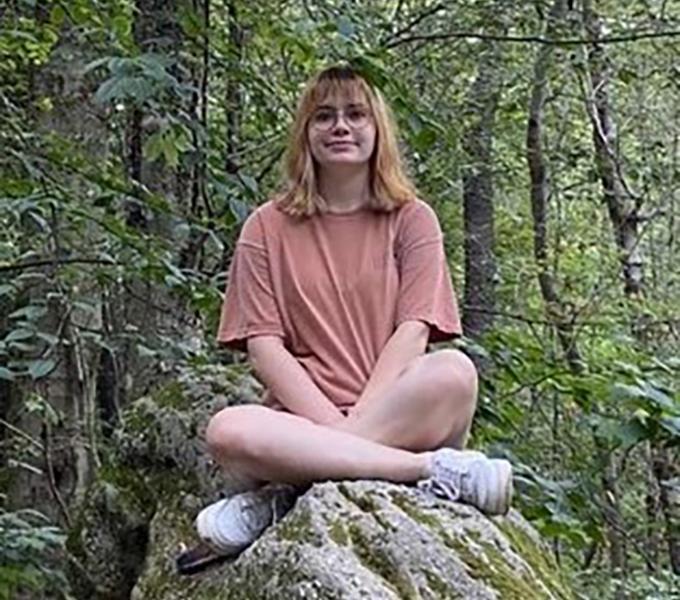 Emily graduated in 2024 with a BS in Environmental Science and minors in Environmental Engineering and Political Science. While with MCSI, Emily supported the center's community-focused sustainability and outreach programs. She helped to expand MCSI’s external outreach through initiatives including K-12 programming, collaborations with the Pitt Community Engagement Centers, and student service projects.
Emily graduated in 2024 with a BS in Environmental Science and minors in Environmental Engineering and Political Science. While with MCSI, Emily supported the center's community-focused sustainability and outreach programs. She helped to expand MCSI’s external outreach through initiatives including K-12 programming, collaborations with the Pitt Community Engagement Centers, and student service projects. - Charles Jewart
-
Charles earned a PhD in Electrical Engineering from Pitt in 2011.
In his own words:
 Since graduating in August 2011, I first spent a semester as a postdoc in Electrical Engineering, where I was the lecturer for Electromagnetics and working with MCSI. Then I took a position at JDS Uniphase (now Lumentum) in January 2012, where I was a Sr. Optical Engineer and designed lithium niobite optical modulators (100 Gb/s, 400 GB/s) and phase modulators for fiber gyroscopes. During this time my work I produced three patents.
Since graduating in August 2011, I first spent a semester as a postdoc in Electrical Engineering, where I was the lecturer for Electromagnetics and working with MCSI. Then I took a position at JDS Uniphase (now Lumentum) in January 2012, where I was a Sr. Optical Engineer and designed lithium niobite optical modulators (100 Gb/s, 400 GB/s) and phase modulators for fiber gyroscopes. During this time my work I produced three patents.After 18 months I moved into a Staff WaferFab Engineer role where I was in a production engineering role to improve yields for the devices I previously designed. I then moved back into R&D and was the technical lead for a 100 GB/s modulator for metro applications. I later moved to Coherent-Nufern, where I was a Principal Engineer overseeing an optical components lab and managed three technicians.
And finally, for the past two years I have been an Engineering Specialist at General Dynamics Electric Boat where I am working on IR&D (Independent Research and Development), technology investigation, university outreach with NIUVT (National Institute for Undersea Vehicle Technology), and assisting companies with SBIR funding as it related to the U.S. Navy’s nuclear submarine force.
My time in MCSI was important as it allowed me to work with engineers from other fields, which is something I’ve had to do since I entered industry. Working with ChemEs, MatSci, MechEs, Physics, technicians, etc.
- Tony Kerzmann
-
Tony holds a BS in Mechanical Engineering in 2004, an MS in Mechanical Engineering in 2007, and a PhD in Mechanical Engineering in 2011. He was also an MCSI IGERT Fellow.
In his own words:
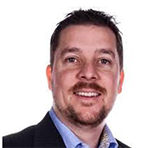 I started my career as an assistant professor in the Engineering Department at Robert Morris University. While working there, I was promoted to Associate professor and received tenure. I was also the Director of the School of Engineering, Mathematics and Science Research and Outreach Center (SEMS-ROC). In June of 2018, I decided to work in real estate as an Asset Manager for JoCo Partners. I was in charge of over 65 employees and managing over $180MM in assets.
I started my career as an assistant professor in the Engineering Department at Robert Morris University. While working there, I was promoted to Associate professor and received tenure. I was also the Director of the School of Engineering, Mathematics and Science Research and Outreach Center (SEMS-ROC). In June of 2018, I decided to work in real estate as an Asset Manager for JoCo Partners. I was in charge of over 65 employees and managing over $180MM in assets.In February of 2019, I was accepted as a visiting professor in the University of Pittsburgh's Department of Mechanical Engineering and accepted a full-time NTS position beginning in the 2019-20 academic year.
MCSI provided many academic and professional experiences that assisted me in my maturation throughout the years. The first was a superior education and opportunity to study one of the most important topics of our generation, Sustainability.
My research and career path led me toward renewable energy and could not have accomplished what I have without the training and opportunities that MCSI provided. As a professor, MCSI supported my research and students through a seed grant and sustainable-related competitions.
As a professional, my favorite conference was and still is the Engineering Sustainability Conference that MCSI organizes on a biannual basis. I am truly grateful for all the education, experiences and assistance throughout my career. MCSI has changed my life and I hope to continue to change lives for the better.
- Lucy Klug
-
Lucy is a former sustainability intern with Mascaro Center for Sustainable Innovation.
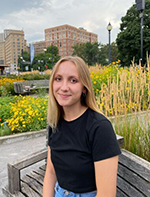 Lucy Klug graduated in 2022 with a BA in Environmental Studies and a certificate in Sustainability. While with MCSI, Lucy led first-year student sustainability presentations and oversaw the Center's social media presence. She was also the president of Epsilon Eta, Pitt's environmental honors fraternity.
Lucy Klug graduated in 2022 with a BA in Environmental Studies and a certificate in Sustainability. While with MCSI, Lucy led first-year student sustainability presentations and oversaw the Center's social media presence. She was also the president of Epsilon Eta, Pitt's environmental honors fraternity. - Sophia Lex
-
Sophia is a former community engagement intern with Mascaro Center for Sustainable Innovation.
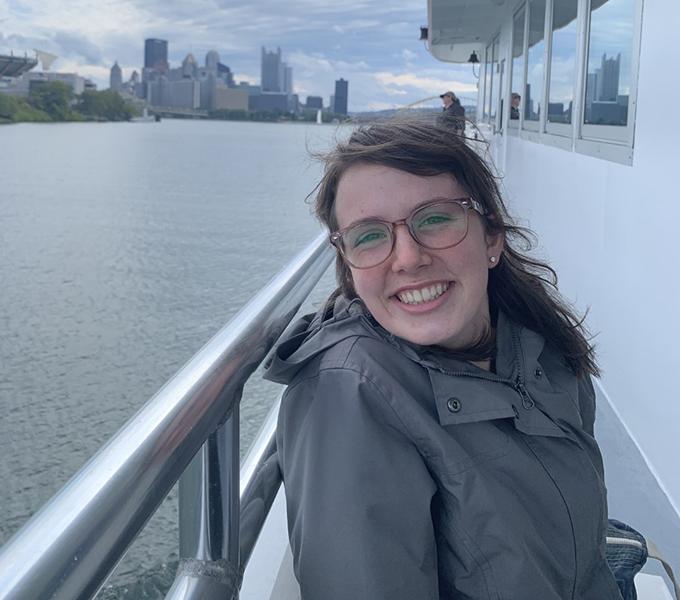 Sophia graduated in 2023 with a BSE in Civil & Environmental Engineering. While with MCSI, Sophia led planning and outreach efforts for ScholarCHEF, a novel undergraduate scholar community in the University's David C. Frederick Honors College. This program engages students in concepts of food sustainability and security, with the primary objective of sparking interest and agency within students.
Sophia graduated in 2023 with a BSE in Civil & Environmental Engineering. While with MCSI, Sophia led planning and outreach efforts for ScholarCHEF, a novel undergraduate scholar community in the University's David C. Frederick Honors College. This program engages students in concepts of food sustainability and security, with the primary objective of sparking interest and agency within students. - Alyssa Martinec
-
Alyssa is a former Sustainability Intern with Mascaro Center for Sustainable Innovation.
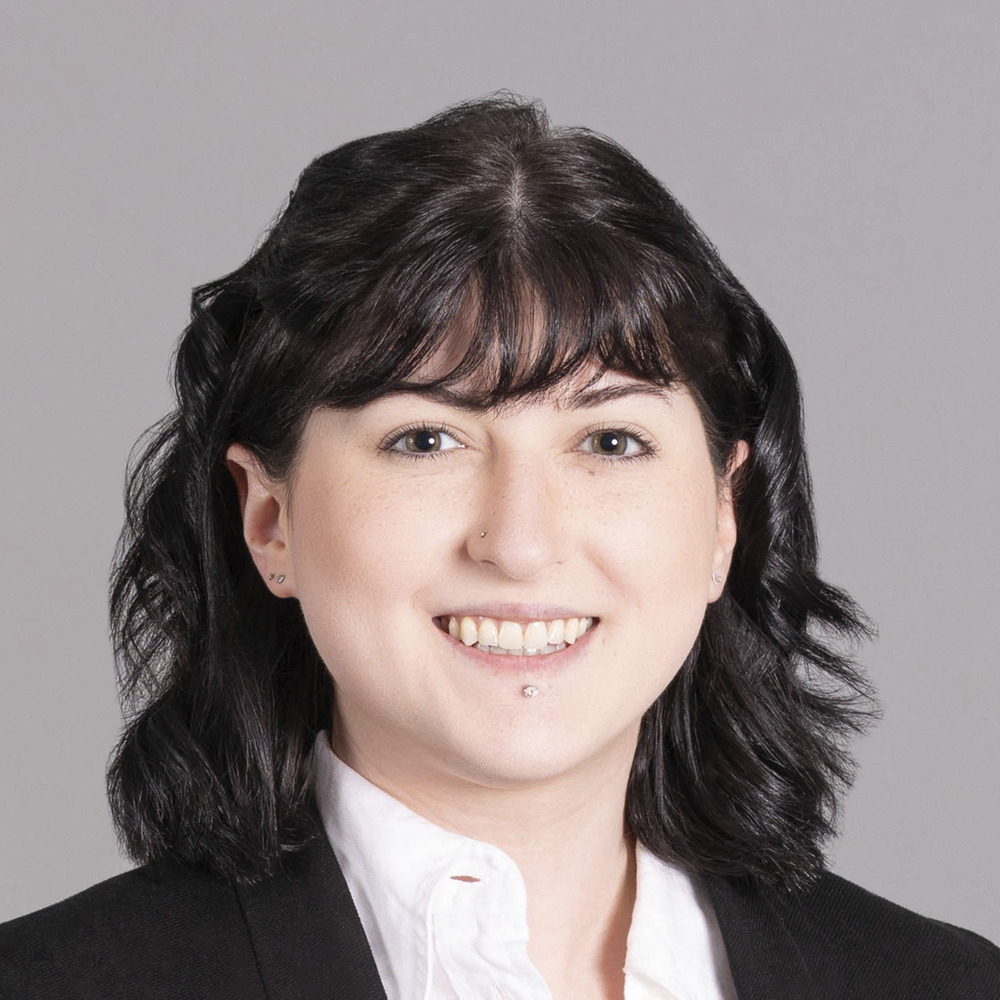 Alyssa is a sustainability specialist at Burns & McDonnell, where she supports the development and delivery of sustainability services. She graduated from the University of Pittsburgh in 2019 with a BPhil in Political Science and International & Area Studies and obtained her MBA and Master of Sustainability degrees from Chatham University in 2023.
Alyssa is a sustainability specialist at Burns & McDonnell, where she supports the development and delivery of sustainability services. She graduated from the University of Pittsburgh in 2019 with a BPhil in Political Science and International & Area Studies and obtained her MBA and Master of Sustainability degrees from Chatham University in 2023.During her undergraduate studies, Alyssa served as the student sustainability coordinator for the Office of Business, Hospitality, and Auxiliary Services in addition to working as an intern for MCSI. She also participated in numerous student organizations, such as Take Back the Tap, the Fossil Free Pitt Coalition, and Students for Sensible Drug Policy. Her undergraduate thesis, titled An Exploration of System Justification in China: Public Opinion on Air Quality, investigated the global phenomenon of environmental degradation as a result of economic growth through interviews with residents in Shanghai.
As a graduate student at Chatham, Alyssa had the opportunity to work as a graduate fellow for the Pittsburgh Higher Education Climate Consortium (HECC) in support of the 2022-23 HECC strategic planning effort. Alyssa now specializes in the delivery of sustainability client services at an architecture, engineering, and construction (AEC) firm, which includes corporate sustainability reporting, materiality assessments, sustainability rating systems, goal setting, strategy development, and implementation of sustainability initiatives.
- Nicole Ostrowski
-
Nicole earned her PhD in Bioengineering from Pitt in 2016.
In her own words:
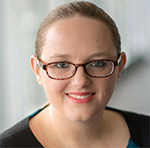 I worked with MCSI during undergrad. I stayed in Pitt for my PhD, shifting to the Bioengineering department to focus on biomaterials for hard tissue applications. During that time, I became interested in management consulting. After defending, I joined an internal consulting team at Arconic. I spent a little over two years with that team before transitioning to a similar team at Highmark Health, where I am currently working.
I worked with MCSI during undergrad. I stayed in Pitt for my PhD, shifting to the Bioengineering department to focus on biomaterials for hard tissue applications. During that time, I became interested in management consulting. After defending, I joined an internal consulting team at Arconic. I spent a little over two years with that team before transitioning to a similar team at Highmark Health, where I am currently working.MCSI was the springboard for how I learned about academic research and became interested in graduate school. Through one of the summer research programs I was able to travel to Brazil and became more comfortable with traveling for a professional purpose.
Finally, working with students and professors at MCSI demonstrated to me that there is a whole group of professionals who are focused on improving the world as their career, not just getting a paycheck. I think that's important for people in younger generations to see!
- Gabrielle Sampson
-
Gabrielle is a former sustainability intern with Mascaro Center for Sustainable Innovation.
 Gabby graduated in 2021 with a BA in Environmental Studies major and a certificate in Global Studies. Outside of coursework, Gabby was a Sustainability Intern for MCSI, focusing on communications and the Year of Engagement.
Gabby graduated in 2021 with a BA in Environmental Studies major and a certificate in Global Studies. Outside of coursework, Gabby was a Sustainability Intern for MCSI, focusing on communications and the Year of Engagement.She was also a Pitt Pathfinder and member of her service and pre-law fraternities. She was also a JumpStart Americorps member and research assistant for Dr. Gamper-Rabindran.
- William Sapon
-
 William Sapon—an alumni of the Katz Graduate School of Business—is dedicated to improving sustainability in more ways than one. A key leader in the sustainability efforts of Peoples Natural Gas, an Essential Utilities Company, a board member of both the Pitt Business Alumni Association and Pittsburgh Region Clean Cities, and a vital figure to the foundation of Pitt’s Center for Sustainable Business, Sapon is using his passion for energy and the environment to transform the Pittsburgh region in multiple aspects.
William Sapon—an alumni of the Katz Graduate School of Business—is dedicated to improving sustainability in more ways than one. A key leader in the sustainability efforts of Peoples Natural Gas, an Essential Utilities Company, a board member of both the Pitt Business Alumni Association and Pittsburgh Region Clean Cities, and a vital figure to the foundation of Pitt’s Center for Sustainable Business, Sapon is using his passion for energy and the environment to transform the Pittsburgh region in multiple aspects.Sapon, who aspired to work in the energy sector for a large portion of his life, first became interested in sustainability during a hiking trip in Central America. After encountering villages without access to power or running water, he recalls realizing that the utilization of renewable power methods would be essential in providing sustainable, reliable, affordable, and resilient infrastructure in such areas. This recognition is still apparent in his efforts today: currently, Sapon is an integral part of Essential Utilities’ mission to create and promote more sustainable infrastructure, assisting in projects such as reducing the company’s Scope 1 and 2 greenhouse gas emissions by 60% from their 2019 baseline and establishing the Pittsburgh International Airport’s current microgrid, which is fully powered by natural gas and solar energy.
Sapon’s commitment to furthering sustainability reaches far beyond the pursuits of Essential Utilities; his impact can also be directly seen on Pitt’s campus at the Katz Graduate School of Business’s Center for Sustainable Business. During his time as a graduate student, Sapon was approached by Professor CB Bhattacharya with an outline of what would eventually become the Center. Sapon recalls how Bhattacharya’s vision immediately resonated with both his personal values and the values of Peoples Natural Gas: “There really was a need for a center not only to convene, but to enable.” The Center not only provides a forum for businesses to discuss sustainability-related challenges, but also initiates change by assisting its partners in adopting sustainable practices; additionally, it provides graduate students with courses, research opportunities, and even a certificate program, all of which focus on teaching sustainable business principles. At the recommendation of Sapon, Peoples Natural Gas was able to form a partnership with the Center for Sustainable Business and become one of its founding corporate members.
His involvement with Pitt Sustainability as a result of both working with the Center for Sustainable Business and holding a board position within the Pitt Business Alumni Association has given Sapon a great appreciation for the University’s environmental efforts. He remarks that, from a business perspective, publications such as the Pitt Sustainability Plan help inform the actions of businesses such as Peoples Natural Gas; additionally, the University’s initiative to integrate sustainability leaders throughout various campus organizations gives corporations the opportunity to form valuable partnerships within multiple areas of the University’s community. Sapon also values the University’s efforts to incorporate sustainability into its various curricula, recognizing that it is a necessary component of virtually any educational background: “Not only Pitt Sustainability, but MCSI and other centers like the Center for Sustainable Business…really do a great job in making sustainability a priority. They…help prepare students become sustainability generalists.” Sapon hopes that, as a result of programs such as MCSI and the Center for Sustainable Business, future generations of students will be able to enter the professional realm with sustainability in mind. Visit esg.essential.co to learn more about Essential Utilities’ commitment to sustainability.
Photo Credit: Tiffany Cooper, Hot Metal Studio
- Lauren Schlusser
-
Lauren Schlusser earned a BA in Environmental Studies in 2018.
In her own words:
 A few days before graduation I accepted a position with Interphase Materials (IPM), an engineering company that spun out of research conducted by a group of bioengineering PhD students at Pitt.
A few days before graduation I accepted a position with Interphase Materials (IPM), an engineering company that spun out of research conducted by a group of bioengineering PhD students at Pitt. At IPM, we design specialized, data-driven solutions wherever biology and technology meet. Currently, IPM largely focuses on commercial and industrial cooling systems—think large-scale air conditioning for multiple buildings. IPM's advanced materials are designed to do two key things: (1) protect these systems from fouling deposits (aka build-up of gunk) which inhibits performance, and (2) make these systems more efficient by allowing them to operate using less energy.
I work on the marketing and business development side of the house to define our target markets and develop messaging that speak to our product's capabilities. This means I work closely with our sales team and product manager so that we continuously refine IPM's product. This work actually ties in nicely with my academic background in environmental studies and sustainability.
Students at MCSI are quite lucky! The center is a creative space, and I would challenge students to not think of it as just another place to get a campus job or internship. If you think of MCSI as the creative space that it is, then you will find there are many opportunities to explore.
Some of the key lessons I learned and tools I gained while working at MCSI include (1) seeking new opportunities and taking initiative; (2) gathering, cultivating, and managing diverse data to complete a project and (3) building relationships with a variety of stakeholders.
To the first point, while at MCSI I proposed that the center and campus sustainability classes collaborate to host a campus wide Sustainability Week. Confidently leading this initiative has helped me advance and inaugurate additional projects at Interphase.
Finally, managing data and relationships is always essential in business, and those related experiences at MCSI have helped me immensely in my marketing work. I regularly have to gather and analyze customer data and ensure that the company maintains a healthy relationship with the customer. If these are not met, the company cannot sufficiently deliver a valuable service.
At the end of the day, much of what I learned at MCSI has helped me in one way or another, and I am very grateful that I had the opportunity to work with the wonderful folks at the center; they are all incredibly dedicated and kind.
- Cassandra Thiel
-
Cassandra earned a PhD in Civil Engineering in 2013. She was also an MCSI IGERT Fellow.
In her own words:
 I graduated from Pitt with my PhD in 2013. Afterward, I had three, one-year postdocs. One was a Fulbright-Nehru award in India; the other two were back at Pitt.
I graduated from Pitt with my PhD in 2013. Afterward, I had three, one-year postdocs. One was a Fulbright-Nehru award in India; the other two were back at Pitt.In 2016, I took an assistant professor position at NYU (joint appointments in SOM, Tandon engineering, and Wagner public service), and I've been building my lab in healthcare sustainability research.
Dr. Melissa Bilec was my PhD and postdoctoral advisor/mentor. She and others at MCSI trained me in the science of sustainability (particularly LCA) while also teaching me key parts of being a successful academic.
- Andrew Trapp
-
Andrew earned a PhD as an Industrial Engineer in 2006.
In his own words:
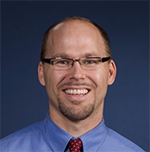 Since my graduation from Pitt in 2011, I have been an Assistant and now tenured Associate Professor of Operations and Industrial Engineering at Worcester Polytechnic Institute in Worcester, Massachusetts. Specifically, my specialty is mathematical optimization, with applications to solving hard decision problems that improve the lives of vulnerable populations, as well as sustainability, healthcare, and operations. I both teach and do research in these areas. My research has recently received recognition with published articles ranging in topic from how data science can fight human trafficking to using technology to address problems in refugee settlements.
Since my graduation from Pitt in 2011, I have been an Assistant and now tenured Associate Professor of Operations and Industrial Engineering at Worcester Polytechnic Institute in Worcester, Massachusetts. Specifically, my specialty is mathematical optimization, with applications to solving hard decision problems that improve the lives of vulnerable populations, as well as sustainability, healthcare, and operations. I both teach and do research in these areas. My research has recently received recognition with published articles ranging in topic from how data science can fight human trafficking to using technology to address problems in refugee settlements. MCSI was absolutely essential to my professional career. Not only did it provide me with fundamental financial and structural support for my PhD, it also enriched my doctoral studies with a more holistic view of sustainability and what can be done with both careful and creative uses of engineering (broadly speaking).
A significant portion of my research agenda, which involves applying optimization to improve the lives of vulnerable populations, can be attributed to the support of MCSI, in the sense that (a) I was able to consider novel (non-traditional) applications of industrial engineering and optimization during my formative years, and (b) that it gave me a perspective of how to use the tools and techniques of my discipline to, in a general sense, improve society.
